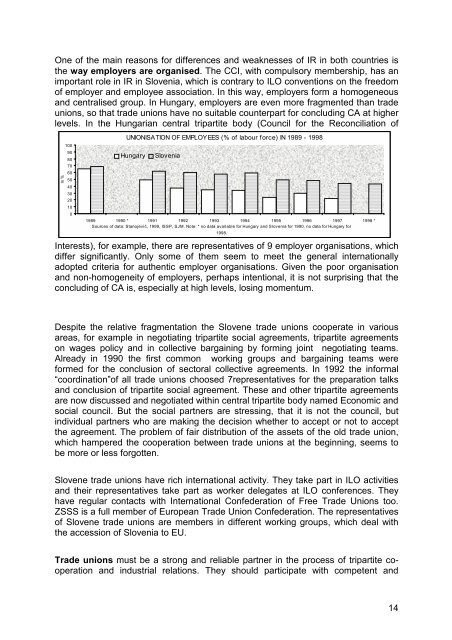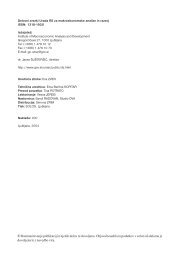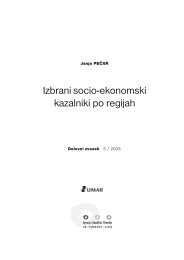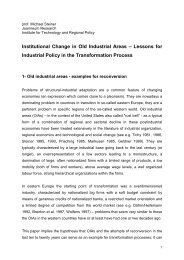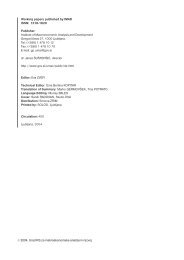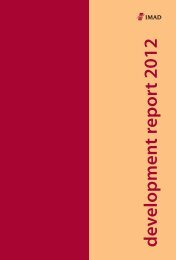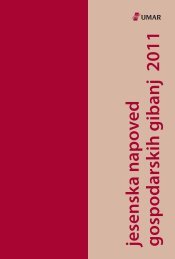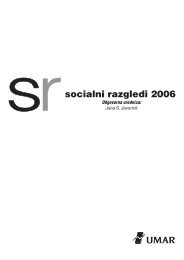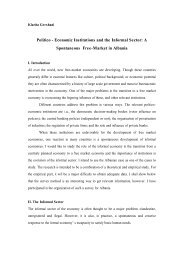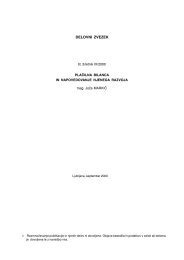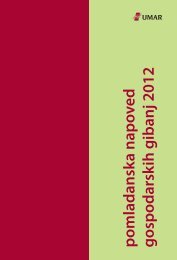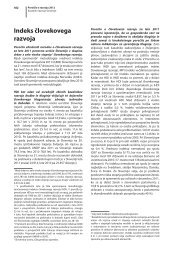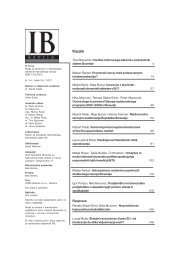The Development of New Industrial Relations in Slovenia - UMAR
The Development of New Industrial Relations in Slovenia - UMAR
The Development of New Industrial Relations in Slovenia - UMAR
Create successful ePaper yourself
Turn your PDF publications into a flip-book with our unique Google optimized e-Paper software.
One <strong>of</strong> the ma<strong>in</strong> reasons for differences and weaknesses <strong>of</strong> IR <strong>in</strong> both countries is<br />
the way employers are organised. <strong>The</strong> CCI, with compulsory membership, has an<br />
important role <strong>in</strong> IR <strong>in</strong> <strong>Slovenia</strong>, which is contrary to ILO conventions on the freedom<br />
<strong>of</strong> employer and employee association. In this way, employers form a homogeneous<br />
and centralised group. In Hungary, employers are even more fragmented than trade<br />
unions, so that trade unions have no suitable counterpart for conclud<strong>in</strong>g CA at higher<br />
levels. In the Hungarian central tripartite body (Council for the Reconciliation <strong>of</strong><br />
In %<br />
100<br />
90<br />
80<br />
70<br />
60<br />
50<br />
40<br />
30<br />
20<br />
10<br />
0<br />
UNIONISATION OF EMPLOYEES (% <strong>of</strong> labour force) IN 1989 - 1998<br />
Hungary<br />
<strong>Slovenia</strong><br />
1989 1990 * 1991 1992 1993 1994 1995 1996 1997 1998 *<br />
Sources <strong>of</strong> data: Stanojevič, 1999, ISSP, SJM. Note: * no data available for Hungary and <strong>Slovenia</strong> for 1990, no data for Hungary for<br />
1998.<br />
Interests), for example, there are representatives <strong>of</strong> 9 employer organisations, which<br />
differ significantly. Only some <strong>of</strong> them seem to meet the general <strong>in</strong>ternationally<br />
adopted criteria for authentic employer organisations. Given the poor organisation<br />
and non-homogeneity <strong>of</strong> employers, perhaps <strong>in</strong>tentional, it is not surpris<strong>in</strong>g that the<br />
conclud<strong>in</strong>g <strong>of</strong> CA is, especially at high levels, los<strong>in</strong>g momentum.<br />
Despite the relative fragmentation the Slovene trade unions cooperate <strong>in</strong> various<br />
areas, for example <strong>in</strong> negotiat<strong>in</strong>g tripartite social agreements, tripartite agreements<br />
on wages policy and <strong>in</strong> collective barga<strong>in</strong><strong>in</strong>g by form<strong>in</strong>g jo<strong>in</strong>t negotiat<strong>in</strong>g teams.<br />
Already <strong>in</strong> 1990 the first common work<strong>in</strong>g groups and barga<strong>in</strong><strong>in</strong>g teams were<br />
formed for the conclusion <strong>of</strong> sectoral collective agreements. In 1992 the <strong>in</strong>formal<br />
“coord<strong>in</strong>ation”<strong>of</strong> all trade unions choosed 7representatives for the preparation talks<br />
and conclusion <strong>of</strong> tripartite social agreement. <strong>The</strong>se and other tripartite agreements<br />
are now discussed and negotiated with<strong>in</strong> central tripartite body named Economic and<br />
social council. But the social partners are stress<strong>in</strong>g, that it is not the council, but<br />
<strong>in</strong>dividual partners who are mak<strong>in</strong>g the decision whether to accept or not to accept<br />
the agreement. <strong>The</strong> problem <strong>of</strong> fair distribution <strong>of</strong> the assets <strong>of</strong> the old trade union,<br />
which hampered the cooperation between trade unions at the beg<strong>in</strong>n<strong>in</strong>g, seems to<br />
be more or less forgotten.<br />
Slovene trade unions have rich <strong>in</strong>ternational activity. <strong>The</strong>y take part <strong>in</strong> ILO activities<br />
and their representatives take part as worker delegates at ILO conferences. <strong>The</strong>y<br />
have regular contacts with International Confederation <strong>of</strong> Free Trade Unions too.<br />
ZSSS is a full member <strong>of</strong> European Trade Union Confederation. <strong>The</strong> representatives<br />
<strong>of</strong> Slovene trade unions are members <strong>in</strong> different work<strong>in</strong>g groups, which deal with<br />
the accession <strong>of</strong> <strong>Slovenia</strong> to EU.<br />
Trade unions must be a strong and reliable partner <strong>in</strong> the process <strong>of</strong> tripartite cooperation<br />
and <strong>in</strong>dustrial relations. <strong>The</strong>y should participate with competent and<br />
14


